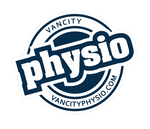Physiotherapists work with a variety of ages towards many goals, from sports injury rehabilitation to postural imbalances to facilitating the progression of developmental milestones. Sessions can be run with play-focused therapy to maintain engagement throughout the session as well as when incorporating suggestions/exercises into home life. This page will go into 3 pediatric conditions that physiotherapy can help with.
Torticollis
Description:
- A condition in younger children where they tend to tilt their heads more to one side and rotate their heads towards the other. It may be associated with tightness in the neck muscles and a strong preference for which side to look/move towards. You may notice that the child may not follow objects with their heads once the object gets too far out to one side and may have a head tilt when at rest.
PT Assessment:
- Resting posture, turning/rotating side preference
- Range of motion in neck
- Strength of neck muscles
- Ability to “correct” head position when tilted (which should develop after 4 months of age)
PT Treatment:
- Stretches in clinic and teaching family how to facilitate stretches at home
- Active strategies to incentivise turning/bending towards the limited side when on ground or being held
- Home program for play-based practice with family encouraging balancing left and right turning and tilting
Toe Walking
Description:
- A condition where when walking, a child tends to keep their heels off the ground and walks on their tiptoes. For some children, this trait goes away eventually, but for others a bit of encouragement/facilitation is helpful!
PT Assessment:
- Evaluating for limitations in range of motion at the ankle
- Looking for muscle tightness and increased muscle tone/activity in the foot and calf muscles
PT Treatment:
- Play-based exercises in clinic and for at-home encouraging range of motion, strength, and stretching
- Education for the family on recommendations for encouraging heel-down walking, discussion re: orthotics
Musculoskeletal Injuries
Description:
- Ranging from playground falls to recreational and competitive sports injuries including ligament sprains, fractures, and muscle tears, kids can benefit from a physiotherapy assessment/treatment just as adults can!
PT Assessment:
- Active and passive range of motion at the joint
- Strength assessment at surrounding muscles
- Observations for swelling, bruising, differences between right and left side anatomy
- Locating source of pain/limitation (what structure is injured and/or causing the pain)
PT Treatment:
- Pain relief strategies and education (positions to limit, activities to modify or hold off on, taping)
- Exercises for mobility (range of motion), stability (balance) and strength
- Progression of exercises towards coordination and sport-specific movements as the injury heals
For these and other pediatric concerns/injuries ask your pediatrician if physiotherapy is right for your child!
Book a consultation today: https://vancityphysio.janeapp.com/
Follow us on Instagram for more information: VanCity Physio (@vancityphysiotherapy)


